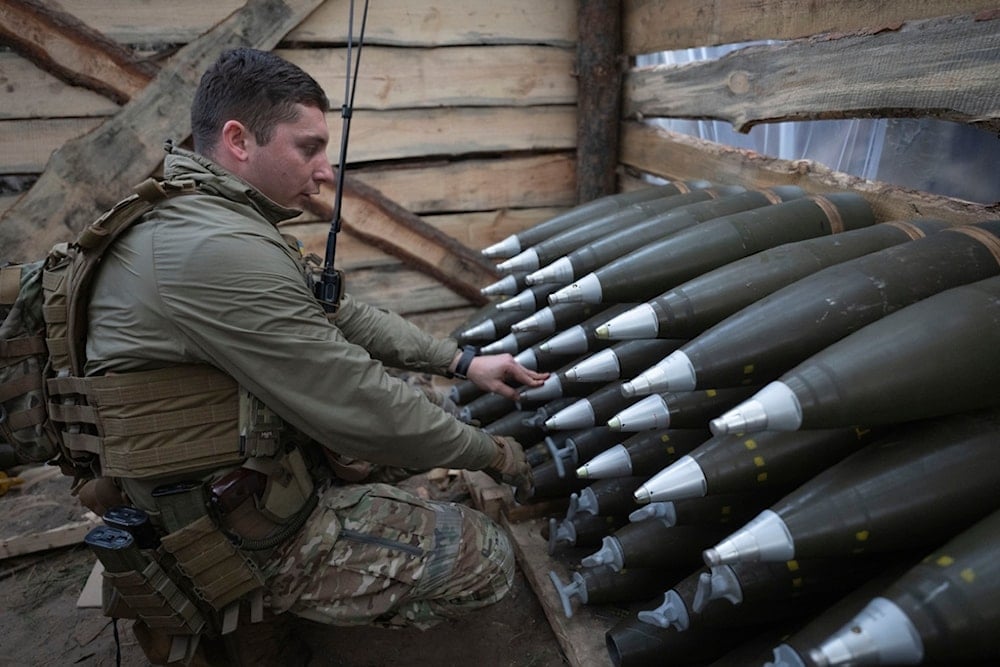US pushes Kiev to lower conscription age amid rising Russian advance
Both the US and Germany are pressuring Kiev to further lower the conscription age to 18, and Zelensky pushes back.
-

A Ukrainian officer of the 92nd separate assault brigade inspects ammunition in a shelter on the frontline near Vovchansk, Kharkiv region, Ukraine, Monday, Oct. 28, 2024. (AP)
The United States is urging Ukraine to lower its minimum conscription age from 25 to 18, citing a need for more manpower to counter Russia's advances. However, this push has drawn criticism from Ukrainian officials who argue that existing logistical challenges and equipment shortages make such a move unreasonable.
Dmitry Litvin, an aide to Ukrainian President Volodymyr Zelensky, condemned the proposal, stating that Ukraine lacks sufficient weapons to arm its current troops.
"It does not make sense to see calls for Ukraine to lower the mobilization age, presumably in order to draft more people, when we can see that previously announced equipment is not arriving on time," Litvin wrote on X (formerly Twitter).
He added, "Ukraine cannot be expected to compensate for delays in logistics or hesitation in support with the youth of our men on the front line."
Growing Pressure on Kiev
According to reports from Reuters and the Associated Press, a senior official in the Biden administration argued that Ukraine's current recruitment and training efforts are insufficient to replace battlefield losses. "The need right now is manpower," the official said, pointing to steady Russian progress in the east, including near Kursk. "Mobilization and more manpower could make a significant difference at this time as we look at the battlefield today."
Reports suggest that Russia has secured territory equivalent to half the size of London over the past month, marking its fastest advances since the early stages of the conflict. US officials believe increased Ukrainian troop numbers are essential to counter these gains, but Litvin and other Ukrainian officials maintain that equipment shortages remain the critical issue.
"Without a pipeline of new troops, the existing units who are fighting heroically on the front lines cannot rotate out to rest, refit, train, and reequip," the US official said, as quoted by Reuters.
Putin's Response to Conscription Push
Russian President Vladimir Putin criticized the idea of lowering Ukraine's mobilization age, labeling it a "criminal" decision by an illegitimate government. Speaking on Thursday, Putin accused Zelensky’s administration of sacrificing its citizens. "They have no right to push people to their deaths and drive them to slaughter," he said, reiterating his stance that Ukraine's authorities remain illegitimate due to the cancellation of elections under martial law.
Putin contrasted this with Russia's military efforts, asserting that Russian troops are fighting "for their Motherland, for the future of Russia and their children." He dismissed the impact of Western weapons supplies, claiming they would not change the outcome on the battlefield.
Read more: Ukrainians risk lives to flee military draft via icy Romanian route
Earlier this year, Ukrainian President Volodymyr Zelensky reduced the mobilization age for combat duty from 27 to 25 under martial law. However, both the US and Germany are now pressuring Ukraine to further lower the age to 18. According to a German Defense Ministry source who spoke to Reuters, Berlin views this move as essential for strengthening Ukraine's military capacity.
Uncertainty in US Support
The Biden administration has reaffirmed its commitment to supporting Ukraine for now, but questions loom as President-elect Donald Trump prepares to take office in January. Trump has signaled an interest in resolving the conflict through negotiations and has tapped retired Lt. Gen. Keith Kellogg to serve as a special envoy for the situation.
Despite strong current support, Ukraine faces mounting pressure to address manpower shortages and sustain its efforts on the battlefield, even as it contends with logistical limitations and shifting international dynamics.
Read more: Kiev officials stole up to half of US aid: Ex-Polish deputy minister
Earlier on Thursday, Putin announced during the Collective Security Treaty Organization (CSTO) Summit in Astana that Ukraine’s decision-making centers, including key military and industrial facilities, could face strikes from Russia’s newest Oreshnik hypersonic missile system. The announcement follows recent strikes on Russian military facilities in Kursk and Bryansk, reportedly using US and UK long-range missiles supplied to Ukraine.

 4 Min Read
4 Min Read









